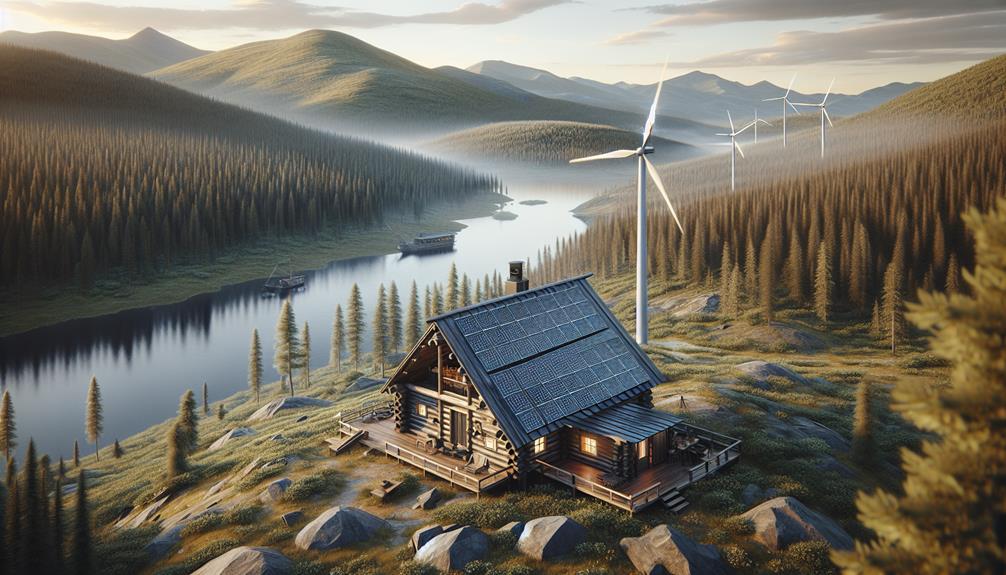Are you tired of relying on traditional power sources and looking for an alternative that is both sustainable and reliable? Look no further than off grid power solutions.
Off Grid Power Solutions
With a myriad of options available, such as solar power systems, wind turbines, micro hydro power, biomass energy, and fuel cells, you can break free from the grid and embrace a greener future.
Off Grid Power Solutions
But which solution is the best fit for your needs? Join us as we explore the world of off grid power solutions and uncover the key factors to consider when choosing the right option for you.
Off Grid Power Solutions
Key Takeaways
- Solar power systems and wind turbines are reliable and sustainable solutions for off-grid electricity generation.
- Micro hydro power is an effective and reliable solution that utilizes the energy of flowing water.
- Biomass energy is a sustainable and efficient way to generate electricity off the grid through the conversion of organic materials.
- Fuel cells are highly efficient and environmentally friendly technology that can convert chemical energy into electrical energy.
Solar Power Systems
Solar power systems are a reliable and sustainable solution for generating electricity off the grid. One of the significant advantages of solar power systems is their ability to harness energy from the sun, a renewable and abundant source. By installing solar panels on your property, you can generate clean electricity without relying on traditional energy sources. This not only reduces your carbon footprint but also helps you save on utility bills in the long run.
The installation process of solar power systems involves several steps. First, a site assessment is conducted to determine the optimal location for the panels, considering factors such as sunlight exposure and shading. Then, the solar panels are mounted on a secure and sturdy structure, such as a rooftop or ground-mounted system. The panels are connected to an inverter, which converts the direct current (DC) produced by the panels into alternating current (AC) that can be used to power your home or business.
Once the installation is complete, you can start enjoying the benefits of solar power. Not only will you have access to clean and sustainable energy, but you may also be eligible for government incentives and rebates that can offset the initial installation costs.
Wind Turbines
Harnessing the power of the wind, wind turbines offer a reliable and efficient solution for generating electricity off the grid. Wind turbine efficiency plays a crucial role in maximizing power generation. It is important to choose a turbine with a high efficiency rating to ensure maximum output. Regular maintenance is also key to keeping your wind turbine operating at peak performance.
To help you understand the importance of wind turbine efficiency and maintenance, here is a table showcasing the average efficiency ratings for different types of wind turbines:
| Turbine Type | Efficiency Rating |
|---|---|
| Small-Scale | 10-20% |
| Mid-Scale | 20-30% |
| Large-Scale | 30-40% |
| Offshore | 40-50% |
As you can see, larger turbines tend to have higher efficiency ratings. However, it’s important to note that the efficiency of a wind turbine can be influenced by various factors such as wind speed, turbine design, and maintenance practices.
Regular maintenance is essential for maximizing the lifespan and efficiency of your wind turbine. This includes inspecting and cleaning the turbine regularly, checking for any damage or wear, and lubricating moving parts. By following a proper maintenance schedule, you can ensure that your wind turbine continues to generate electricity efficiently and reliably for years to come.
Micro Hydro Power
For off-grid power solutions, one effective and reliable option is micro hydro power. Small scale hydro power systems harness the energy of flowing water to generate electricity. Here are three reasons why micro hydro power is a sustainable water energy solution:
- Renewable Resource: Micro hydro power utilizes the energy of flowing water, which is a renewable resource. As long as the water source remains constant, the system can continuously generate electricity, providing a reliable power source for off-grid communities.
- Low Environmental Impact: Unlike traditional hydroelectric power plants, micro hydro power systems have a small environmental footprint. They don’t require large dams or reservoirs, minimizing the impact on ecosystems and local communities. Additionally, these systems can be designed to allow fish and other aquatic species to migrate freely.
- Cost-effective: Micro hydro power systems are cost-effective in the long run. Once installed, they require minimal maintenance and have a lifespan of up to 50 years. The initial investment can be recouped over time, providing affordable and sustainable power to off-grid areas.
Biomass Energy
One alternative to micro hydro power for off-grid power solutions is biomass energy, which offers a sustainable and efficient way to generate electricity. Biomass energy involves the conversion of organic materials, such as agricultural waste, wood pellets, or energy crops, into heat or electricity. This process, known as biomass conversion, harnesses the energy stored in plant matter and converts it into usable power.
Sustainable agriculture plays a crucial role in the production of biomass energy. By cultivating energy crops, farmers can provide a renewable source of biomass feedstock for power generation. These crops, such as switchgrass or miscanthus, are specifically grown for their high energy content and ability to thrive in diverse environmental conditions. The cultivation of energy crops promotes sustainable land use and reduces dependence on fossil fuels.
Biomass energy offers numerous advantages for off-grid power solutions. It’s a reliable and constant source of energy that can be generated locally, reducing the need for long-distance transmission lines. Additionally, the use of biomass energy contributes to carbon neutrality, as the carbon dioxide emitted during combustion is offset by the carbon dioxide absorbed by the plants during their growth. This makes biomass energy a sustainable and environmentally friendly choice for off-grid power generation.
Fuel Cells
Fuel cells are a highly efficient and environmentally friendly technology that can provide off-grid power solutions. They work by converting chemical energy, typically from hydrogen, into electrical energy through an electrochemical reaction. Here are some key points to help you understand fuel cells better:
- Fuel cell efficiency:
- Fuel cells have the potential to achieve high efficiency levels, with some types reaching up to 60% or more.
- The efficiency of fuel cells isn’t affected by the size of the system, making them suitable for a wide range of applications.
- Unlike traditional combustion engines, fuel cells don’t produce greenhouse gas emissions, resulting in reduced environmental impact.
- Hydrogen storage:
- Hydrogen is the most common fuel source for fuel cells due to its high energy density and environmental benefits.
- Storing hydrogen can be challenging, as it requires compression or liquefaction to achieve sufficient energy density.
- Researchers are exploring alternative methods of hydrogen storage, such as solid-state or chemical storage, to overcome these challenges.
- Advantages of fuel cells:
- Fuel cells offer quiet operation and low maintenance requirements, making them suitable for residential use.
- They provide a reliable source of power that can be used in remote locations or during power outages.
- Fuel cells can be integrated with renewable energy sources, such as solar or wind, to achieve a more sustainable and resilient off-grid power solution.
Frequently Asked Questions
Are Off-Grid Power Solutions More Expensive Than Traditional Grid-Connected Systems?
Off-grid power solutions can be more expensive than traditional grid-connected systems. However, they offer the advantage of self-sufficiency and can save you money in the long run. Traditional grid systems have potential drawbacks, such as reliance on centralized power and vulnerability to outages.
How Long Do Solar Panels Typically Last and What Is Their Maintenance Requirement?
Solar panels typically last around 25-30 years with regular maintenance. They require cleaning to remove dirt and debris, and occasional inspection for any damage or malfunction. Regular solar panel maintenance ensures optimal performance and longevity.
What Are the Advantages and Disadvantages of Wind Turbines Compared to Other Off-Grid Power Options?
When comparing wind turbines to other off-grid power options, it’s important to consider their advantages and disadvantages. Wind turbines offer renewable energy and can be cost-effective, but they require a suitable location and may be noisy.
Is Micro Hydro Power Suitable for All Geographical Locations or Are There Specific Requirements?
Micro hydro power has specific requirements for geographic locations. It relies on a consistent source of flowing water, such as rivers or streams. Consider potential environmental impacts before implementing micro hydro power systems.
How Does the Efficiency of Biomass Energy Compare to Other Renewable Energy Sources Like Solar and Wind Power?
When comparing the efficiency of biomass energy to other renewable sources like solar and wind power, it is important to consider factors such as government incentives. Biomass efficiency can vary, making it necessary to evaluate specific circumstances.
Conclusion
As you venture into the realm of off-grid power solutions, you’ll find a world of possibilities waiting to be harnessed. From the dazzling rays of solar power systems to the graceful dance of wind turbines, the flowing currents of micro hydro power, and the hidden potential of biomass energy, these technologies hold the key to a sustainable future.
Embrace the power of fuel cells and unlock a world where energy independence becomes a reality.




